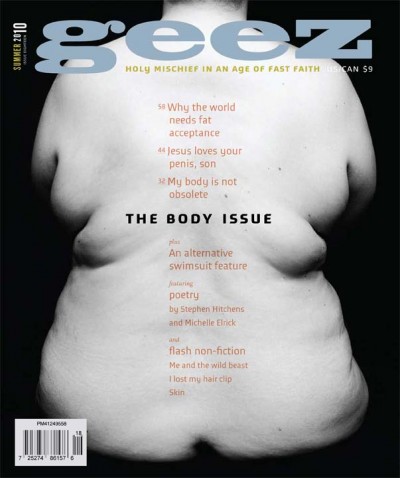Fat acceptance: a basic primer
Fat acceptance – also known as size acceptance, body positivity, weight neutrality and not-waxing-rhapsodic-about-dieting – is a social and corporeal justice principle, founded on the revolutionary idea that it is not productive to spend every waking moment of every day actively hating your body. We live in a fat-fearing and food-moralizing culture where magazines, movies (often involving the hackneyed application of fat suits) and a multi-million dollar “health” and diet industry all pump out the message “thinner is better” – not unlike an unrelenting, cacophonous and extremely distracting trumpet.
A lot of time, effort and capital has been invested in making us believe that fat is a dirty word, a state indicative of moral decrepitude, visual shorthand for lazy, undisciplined, incapable and out of control. To stand pointedly and unapologetically outside a narrow beauty politic constitutes a radical act. It takes a lot of stones to tell well-meaning but misinformed friends, relatives and health care professionals who’ve become accustomed to the brass quartet of lazy-science-and-blanket-judgment that you’re not sorry for your size, you’re pretty down with your bad self and actually, while we’re on the subject, what you do with and put in your body is your own business thankyouverymuch.
The fat acceptance movement – which counts activists, academics, doctors and rock stars among its diverse ranks – catches a lot of fire because if there’s one thing that makes people uncomfortable it’s questioning the efficacy of shame as a motivational tool. Pervasive rhetoric – capitalist, religious, economic – tells us that suffering and self-sacrifice both pave the way to success, and allow us to explain away injustice, to believe that swallowing a daily dose of shit is acceptable, part of the game. So of course people bristle when told that not only do diets – which represent a bodily act of contrition – not work, but that you can opt out, and that once you do, there are other much better better places to play. And while it’s a big relief to have someone point out, as feminist critic Dorothy Allison has, “that suffering does not ennoble; it destroys,” it can start out feeling like a slap in the face especially if you, as I did, devoted much of your conscious life to the pursuit of thinness.
When you open up to the possibility that you can live your life right now instead of waiting for an arbitrary number on the scale, or on the tag in your pants, it blows your world apart. When you adopt a stance of body autonomy and accept the notion that not only is health not intrinsically connected to height and weight, but is relative, personal, highly variable and not a moral debt to be paid, life becomes enjoyable and navigable in ways you never thought possible. This concept – that your body is your business and that you should feed it, move it, and adorn it for no grander purpose than that it is pleasurable and feels good, no matter what your weight yesterday, today, or tomorrow – is the basis of Health at Every Size.
And one of the disarming ironies of fat acceptance is that, once you step outside the panopticon of self-loathing and cease obsessing about your body and the ways it deviates from an impossible ideal, you become much more aware of the mechanics of what makes you feel satisfied, invigorated, and inspired and your choices – about food, physical activity, and personal presentation – reflect your needs and your identity. More than that, in accepting your body as it is, you help to create a culture that respects and values the diversity of all bodies, a culture that, to return to Allison, “refuses lying myths and easy moralities,” that sees people as “human, flawed and extraordinary.” Back when I was punishing my body with four-hour workouts and styrofoam food that filled me with little else than despair, I never felt any sort of triumph or control over myself or my life, or deep engagement with the world around me. All my time and energy was spent buying into a loser’s game with a moving set of goal posts because – surprise! – capitalist diet culture is in the business of manufacturing failure, a self-sustaining economy of never-ending problems with impermanent purchasable solutions in the form of magic herbs, vibrating hot pants and “fixing” creams. It was only when I shut out the racket of diet discourse and refused to subject myself to an unforgiving beauty politic – reclaiming my body as my own – that I felt I had any agency, and valued it in others.
Cynara Geissler has recently stumbled into a torrid love affair with frozen peas. “So delicious, so cold.” She lives in Vancouver, British Columbia.



Sorry, comments are closed.